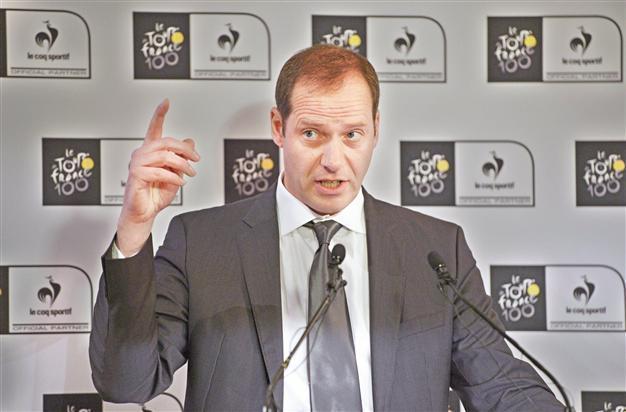Tour boss: Cycling not sport’s ‘ugly duckling’
SYDNEY - Agence France-Presse

Tour de France boss Christian Prudhomme says ‘Cycling is not a perfect world, but it’s changed.’ AFP photo
Tour de France boss Christian Prudhomme yesterday said the scandal-ridden sport of cycling had changed and is no longer “the little ugly duckling” it is made out to be.Cycling has been rocked by disgraced US cyclist Lance Armstrong’s admission that he doped throughout his career, in which he won the Tour de France seven times before being stripped of the victories. Prudhomme, in Sydney to promote the 100th edition of the world’s most famous bike race from June 29 to July 21, acknowledged cycling has its problems, but insisted it has changed in the wake of the Armstrong affair. “That’s the past,” he told Australian Associated Press.
“He (Armstrong) wasn’t there last year, he wasn’t there the year before.“We can’t keep an image in the media from the past in what’s happening now. Cycling is not a perfect world, but it’s changed.”
Prudhomme said an agreement between the International Cycling Union (UCI) and the French anti-doping body to conduct tests at this year’s Tour made cheating even harder than provided for under world sporting rules.
The two bodies had been at loggerheads since March’s Paris-Nice race but have now found common ground ahead of the sport’s glamour event. It allows the French Anti-Doping Agency (AFLD) to have complete access to riders’ biological passports and their locations. “There are a lot of sporting events where the French anti-doping doesn’t intervene at all and there are no questions, no-one asks questions. “(Yet) we have to be above everyone else and above the world sporting rules.
So we’re not guaranteeing anything, it’s not for me to guarantee it (will be a clean race). “But world cycling is not the little ugly duckling that we point our finger at.” Prudhomme added that cycling was a pioneer in anti-doping, with the introduction of biological passports in the sport. “Just to the point now, where there are other sports -- tennis, cross-country skiing, athletics -- now they are using those passports,” he said.
















